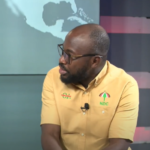Less than 60 days to Ghana’s National Elections; the independent verification and fact-checking project – Dubawa, has challenged journalists to be conscious of the critical role of the media in fostering a sanitized information ecosystem.
With social media already awash with disingenuous smear campaigns; Ghana anticipates a high tide of misinformation, disinformation, and misinformation deliberately circulated by malicious political elements as December 7 inches closer.
A two-day training organized by Dubawa and the American Corner of the United States Embassy presented an all-rounded course aimed at reorienting journalists and exposing media practitioners to the most modern tools for fact-checking and tracking information.

Seasoned broadcaster and Lecturer with the Kwame Nkrumah University of Science and Technology Nana Kwadwo Jantuah’s sessions combined literature and theories in journalism to prompt a compelling awakening to media practice and how it shapes the conscience of society
Demonstrating how seemingly negligible media blips could have irreversible repercussions on the entire nation; Nana Jantuah drummed home the need for the media fold to uphold ethical standards underpinned by a no tolerance approach towards all forms of bias and unverified information.

Programs Manager for Dubawa West Africa, Roselena Ahiable facilitated a revealing, hands on dive into the different digital tools that contemporary journalists inevitably require to fact check claims; fish out sinister content; conduct research; simplify tasks; present information in user friendly formats etc.
A senior lecturer with the media and communications department of the Kwame Nkrumah University of Science and Technology Dr. Daniel Nkrumah capped it off with a lecture on the lapdog, watchdog, guard-dog and guide-dog styles of journalism reechoing how journalists could be either controlled or swayed by different motivations and external influences.
Speaking to Ultimate News on the sidelines of the training, he emphasized, “The desired ones are the watch and guide dogs. Those who watch with very high ethical and professional awareness and the ones who tend to guide those who are not so versed in media literacy in navigating social media and its ‘infodemic’ issues”.

Dubawa
Programs Manager Dubawa WA, Roselena Ahiable underscored the importance of the elections related media information and literacy workshop in safeguarding Ghana’s peace and democracy.
“There are more critical issues at hand because it is elections. We need journalists to be more conscious of the importance of fact checking and media information literacy to give the right kind of information to promote a safe and sanitized information ecosystem going into elections,” she told reporter Ivan Heathcote – Fumador.
USA Gov’t Support
Matthew Asada, Press Attaché for US Embassy Ghana led an interactive and fruitful Q/A session where journalists and students asked probing questions about diplomacy; the pending American elections, global media regulations, geo political issues among others.
He pointed out that such capacity building events made possible by the American Spaces and the support of the American Embassy in Ghana formed part of the commitment of his country to helping Ghana build and sustain a resilient democracy.
Empowered Journalists
Participating Journalists; most of whom are already in the thick of pre elections reporting, shared positive reviews about the richness of the training program and the empowerment they had received to perform their duties with renewed alertness.
“While the advent of social media has made information so volatile; fact checking is the sure way to stand out. Having been part of this training as a journalist, and going through the tools, methods and techniques of fact checking, it is going to enhance my work and support me put out quality content,” Clinton Yeboah of the Multimedia Group admitted.
Fatau Bayaga from Orange FM stated that learning to fact-check images and videos was particularly beneficial during election periods when misleading footage circulates.
“Learning to Fact check pictures and videos has been beneficial because we know that in election periods people circulate all kinds of footages to claim people are snatching ballot boxes and other incidents. I think I am better equipped to run a fact check now, to determine whether those were taken years ago to better inform the public,” Fatau Bayaga shared.
The theme for the workshop “Building the Electoral Information Literacy and Fact-Checking Skills of Tertiary Students and Journalists” aligned with the different training modules which included Media and Information Literacy, Understanding Information Disorder and Fact-Checking.
Source: Ghana/Starrfm.com.gh/103.5FM/Ivan Heathcote – Fumador


